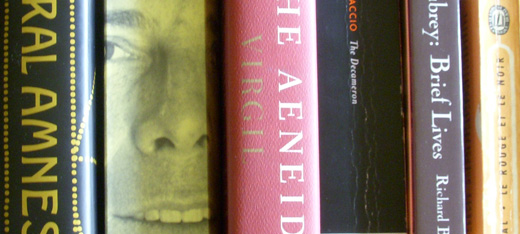Wednesday: Morning Read
¶ In the Decameron, VII, viii, the unfaithful wife ties a string to her big toe. When her boyfriend tugs on the other end, below her window, she lets the string slip if she’s alone and the coast is clear. The husband discovers the string and sees instantly what it means, but because he’s a buffoonish merchant — un mercatantuzzo di feccia d’asino, according to his mother-in-law’s exuberant, Mamma-Mia stream of abuse — while his wife is an aristocratess, her clever duplicity wins the day, and Arrigruccio is left standing like a smemorato — like an idiot.
¶ In the Aeneid, Book X opens with a parley among the gods on Olympus. For the most part, Venus and Juno duke it out with self-righteous tirades. This sort of thing is immensely more interesting when set to music by Richard Wagner.
¶ James Merrill. I see what my difficulty with these poems is going to be. Beneath the surface of beautiful language lies a veneer of reference — not of references to the tenors of this or that metaphor, but of Reference. John Donne’s poetry makes Reference, in this generalized, permeating way to celestial mechanics as it was understood at his interestingly transitional moment in what we now call the history of science. I learned that much in school — where I also learned about those mechanics. I feel countervailingly ignorant of the Reference that I sense in Merrill, and disinclined to be seen stumbling in search of a key to it. A wiser head might lay this volume aside. But I shall read the poems as I read Wallace Stevens: for the beauty, which eventually announces, if his lines are read aloud often enough, a Meaning beyond Reference. All I can do for the moment is quote.
From “The Black Swan”
And move across our lives, if the lake is life,
And by the gentlest turning of its neck
   Transform, in time, time’s damage;
  To less than a black plume, time’s grief.
From “The Broken Bowl”
          Freed from these now,
Like love it triumphs through inconsequence
And builds its harmony from dissonance
And lies somehow within us, broken, as though
   Time were a broken bowl
And our last joy knowing it shall not heal.
From “The Green Eye”
Aware of change as no barometer
You may determine climates at your will;
Spectrums of feeling are accessible
If orchards in the mind will persevere
On their hillsides original with joy.
Enter the orchard differently today:
¶ In Aubrey: Dee, de Laune, Denham, and Descartes. Of Descartes:
He was too wise a man to encumber himself with a wife; but as he was a man, he had the desires and appetites of a man; he therefore kept a good conditioned handsome woman that he liked, and by whom he had some children (I think two or three.)
John Dee is an old friend, familiar from Koestler’s book about Kepler but also from one of the very first history books that I ever read through, Edith Sitwell’s The Queens and the Hive. (“That explains everything,” I hear you mutter.)
¶ In Le rouge et le noir, Julien is taken to the conspirators’ meeting. Exactly what the conspirators is after remains murky, but the reactionary nature of their aims is made crystal-clear.
Formez vox bataillons, vous dirai-je avec la chanson des jacobins; alors il se trouvera quelque noble GUSTAVE ADOLPHE, qui, touché du péril imminent du principe monarchique, s’élancera à trois cent lieues de son pays, et fera pour vous ce que Gustave fit pour les princes protestants. Voulez-vous continuer à parler sans agir? Dans cinquante ans il n’y aura plus en Europe que des présidents de république, et pas un roi. Et avec ces trois lettres, R, O, I, s’ent vont les prêtres et les gentilshommes. Jed ne vois plus que des candidats faisant la cour à des majorités crottées.
I expect that Stendhal believed that his readers would find the invocation to Gustavus Adolphus, Swedish savior of the Protestant cause in the Thirty Years’ War, hilariously maladroit.
¶ Clive James on Stefan Zweig, in four parts. Zweig represents for James something of an ideal humanist, and he takes the writer’s suicide, in Brazil in 1942 (when, as James says, it was clear that the Nazis weren’t going to prevail ultimately), as a salutary smell that ought to keep us lucky later ones on our guard against the forces that marshal against the humanist project — foremost among them, of course, ideologies of any stamp. The pursuit of ruliness is deadly to humanism:
The natural state of affairs between exponents of the humanities is one of tension, suspicion, rivalry and, all too often, enmity. Only a catastrophe can bring about, among its survivors, any degree of the automatic mutual regard that Zweig dreamed of so fondly. A great deal of creativity arises from conflict between the creators, and it tends to be annulled when they are driven to make peace by supervening circumstances.

